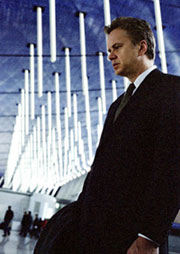
Code
46
Michael Winterbottom, director
Review by Rada Djurica
Will the Clash’s Mick Jones, who sang the hilarious “Should
I Stay Or Should I Go,” be remembered in the karaoke bars the future?
Or is this movie, instead, set closer in time to the present day? Perhaps
we should ask Winterbottom: will the old stars sing their songs in the
karaoke bars of the future?
This is a very strange movie, as if you’re watching an art film with sexy little details passing by. We have Tim Robbins and Samantha Morton, the craziest film partners ever. Remember the Australian lesbian copper in Enduring Love, investigating the murder of a poetic teenager? That was Morton. But this time she’s heterosexual, with a futuristic video-screen photo album and a dream of traveling by subway, one station shorter every time, as the days pass by. Code 46 is appealing to romantics. A near-future allegory, part myth and part daydreaming, told with Winterbottom’s observational style. Very sexy, but a bit boring, too.
Commercial films set in the future rarely offer pleasant conceptualizations of what our world will be like in the coming age. An endless theme of futuristic celluloid dystopia comes out of Hollywood, which includes vampires and aliens taking over the country, often presented amidst visions of gleaming cityscapes, flying cars, and smoking, green-skinned alien babes. Code 46 is something else. This is a more likely, less exciting version of the future. Code 46 is fantastic to look at: a beautiful metropolis, in the middle of the desert (Seattle and Shanghai).
Winterbottom doesn’t depend on the glamor of cityscapes. The film is set in a not-too-distant future where access to some areas is severely restricted. Visitors are given a certain length of time where they have “cover,” the diplomatic protocol. The plot is pretty melodramatic, but wisely muted with keywords such as: corporate entities, genetic coding, multicultural whitewashing, language barriers, secret passports, checkpoints, computer security...phone holograms. Overall, it's a very attractive, positive view of a not so attractive future.
William (Tim Robbins) is an inspector on the trail of forged cards that have been allowed to travel between cities illegally. He’s coming to Shanghai to talk to the manager of a plant who manufactures the cards, and his investigations lead him to Maria (Samantha Morton), a worker in the plant. William, with the help of an empathy virus that allows him borderline psychic powers, finds out Maria is the felon. But he also falls in love with her. And she’s Samantha Morton, after all, from that Australian film you know.
Things go from bad to worse when William returns to Shanghai, as Maria has her memory erased. The pair flee the city, and from there the movie makes a turn into some pretty ridiculous territory. I’m not sure you can call what they have “love,” but if the movie is talking about a realistic future, none of us will have time for love anyway, between the effects of global warming and an utter loss of privacy.
Code 46 tells the story about love found and lost, with tragic elements borrowed from the Oedipus legend. The man attempts to arrest the girl but falls in love. We utterly accept their love as a sublime thing that happens when two people make the right eye contact, a love caused by genetics instead of fairy tales.
Samantha Morton does have some wild sex scenes, as usual, in the concept of physical touching, symbolizing perhaps feelings and maybe empathy, as well. “Something about yourself,” may be the most emotionally conflicting, an self-trusting mantra that invites to establish a sort of robotic intimacy. From that point of view I think the film is successful.